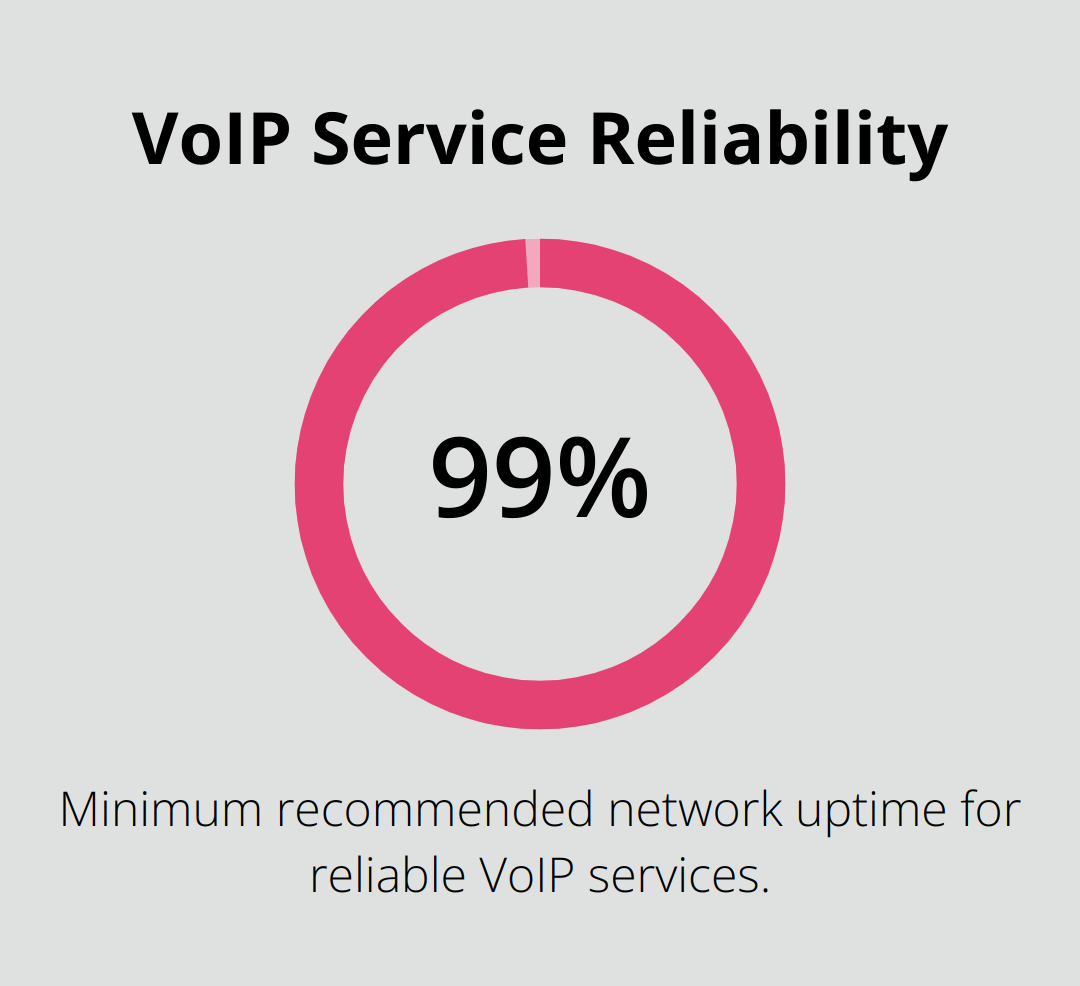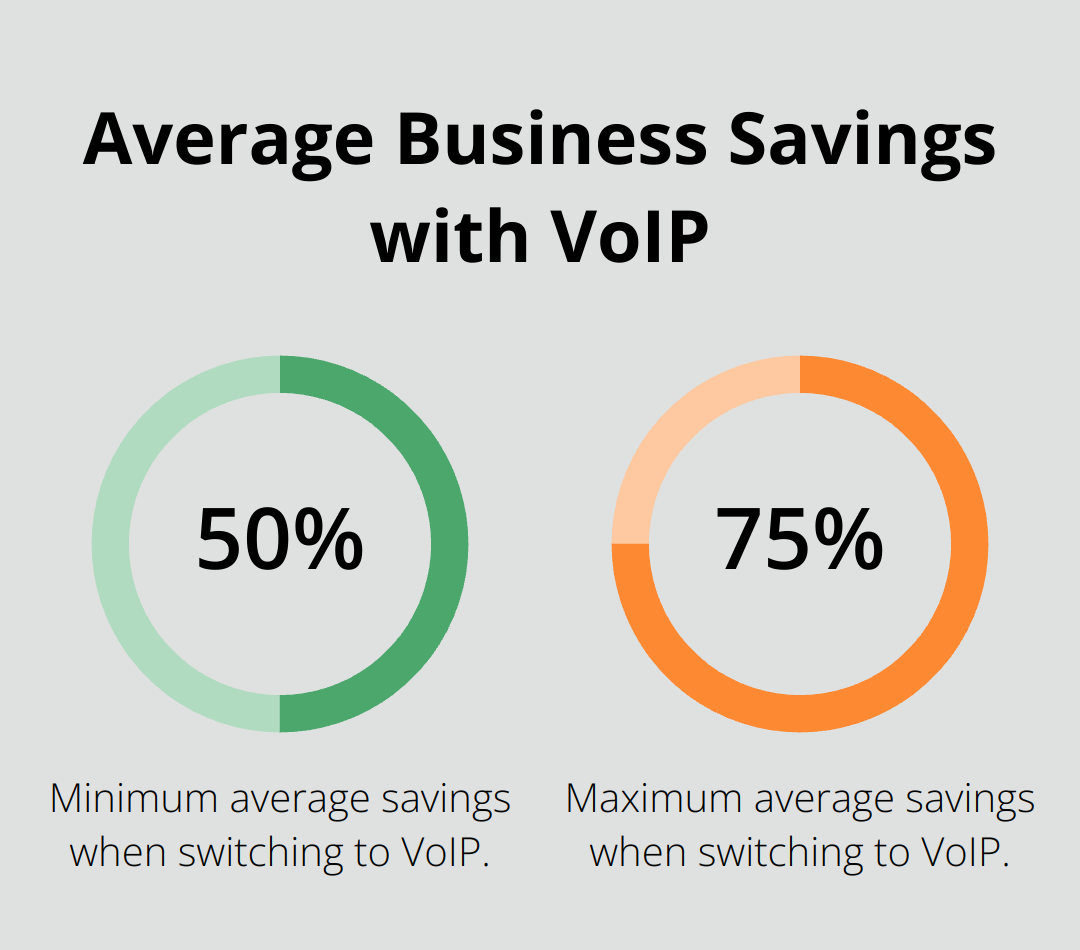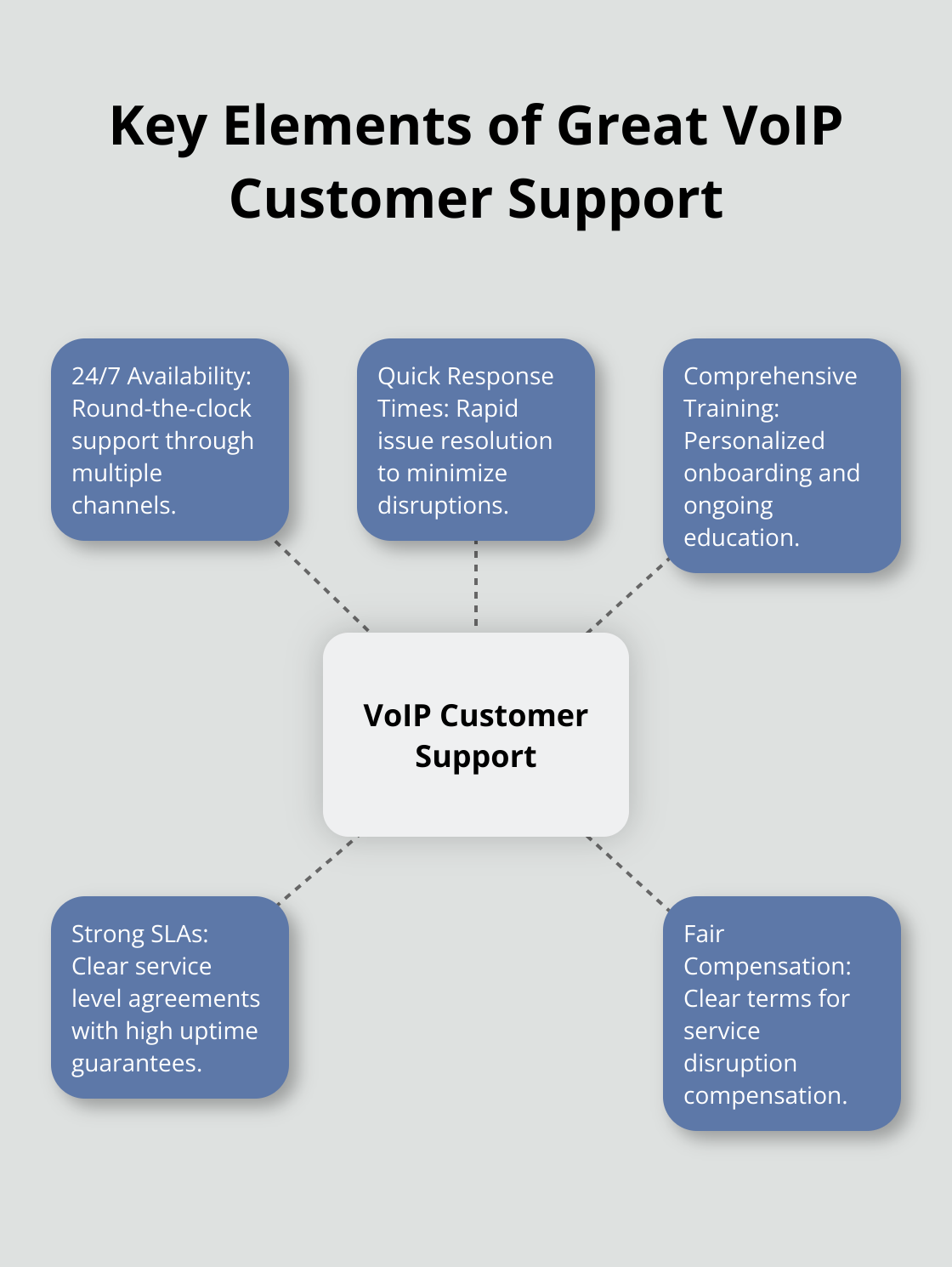VoIP services play a central role in how modern businesses stay connected, but choosing the right one can be overwhelming. With so many providers, plans, and features to sort through, it’s easy to feel unsure about where to start.
At UCaaS Review, we’re here to make that process simpler. This guide outlines the key factors to consider when comparing VoIP services, including features, pricing, and support, so you can choose a solution that fits your business with confidence.
Key Features to Consider When Comparing VoIP Services
When you compare VoIP services, you need to focus on features that directly impact your business operations. Several critical aspects can make or break your VoIP experience.
Call Quality and Reliability
The foundation of any VoIP service is its ability to deliver clear calls consistently. Look for providers that offer HD voice quality and maintain a network uptime of at least 99.99%. It’s important to understand how providers ensure reliability and guarantee 99.99% availability. However, you should test the service in your specific environment, as local internet conditions can affect performance.

Scalability and Flexibility
Your VoIP system should grow with your business. Choose providers that allow easy addition or removal of users without lengthy contracts or high fees. Nextiva offers flexible plans that you can adjust monthly, which caters to businesses with fluctuating needs. This flexibility can save you significant costs in the long run, especially for seasonal businesses or those experiencing rapid growth.
Integration Capabilities
VoIP truly shines when it integrates seamlessly with your existing tools. Select services that offer robust APIs and pre-built integrations with popular CRM systems, helpdesk software, and productivity tools. Vonage Business Cloud integrates with over 20 business applications (including Salesforce and G Suite), which streamlines workflows and boosts productivity.
Mobile and Desktop Apps
Comprehensive mobile and desktop applications are essential. These apps should offer full functionality, including video conferencing, messaging, and file sharing. 8×8’s mobile app allows users to switch seamlessly between devices mid-call, which ensures uninterrupted communication whether you’re in the office or on the go.
Security and Compliance Features
Data protection is paramount, especially for businesses that handle sensitive information. Prioritize VoIP providers that offer end-to-end encryption, multi-factor authentication, and compliance with industry standards like HIPAA or GDPR. Zoom Phone provides AES 256-bit GCM encryption for all calls, which ensures your conversations remain confidential.
As you evaluate these features, align them with your specific business needs. A small startup might prioritize scalability and mobile apps, while a healthcare provider would place more emphasis on security and compliance features.
Now that you understand the key features to consider, let’s explore the various pricing models and cost considerations that come into play when selecting a VoIP service.
Pricing Models and Cost Considerations for VoIP Services
Per-User vs. Per-Line Pricing
VoIP services typically offer two main pricing structures: per-user and per-line. Typical per-user or per-line fees for VoIP phone systems generally range from about $15 to $40 per month. This model often proves more cost-effective for businesses where employees need multiple devices or lines. Per-line pricing charges for each phone number or line, which can benefit companies with shared phone lines or those requiring fewer features per user.
Setup and Hardware Costs
Initial costs vary significantly between providers. Some offer free setup and installation, while others charge substantial fees. For instance, RingCentral provides free implementation for its Premium and Ultimate plans (potentially saving businesses thousands in setup costs). Hardware costs also play a role – while many VoIP services work with existing devices, specialized VoIP phones can range from $50 to $500 per unit. Polycom’s VVX 150 (a popular entry-level VoIP phone) costs around $89, while high-end models like the Yealink T58A can exceed $300.
Hidden Fees and Additional Charges
Vigilance about hidden fees can prevent bill inflation. Common culprits include international calling charges, number porting fees, and early termination penalties. For example, Vonage Business charges $39.99 per number for porting (which can add up quickly for larger organizations). Some providers also charge for features like call recording or advanced analytics. Always request a detailed breakdown of all potential charges before committing to a service.
Return on Investment (ROI) Calculations
To understand the true value of a VoIP system, calculate its return on investment. Consider factors like reduced calling costs, increased productivity, and lower maintenance expenses. Businesses can experience average savings between 50-75% when switching to VoIP. Additionally, VoIP can boost productivity – 67% of mobile workers report an increase in productivity and efficiency after implementing VoIP.

When evaluating VoIP services, don’t focus solely on the sticker price. Consider the total cost of ownership, including setup, hardware, and potential hidden fees. Compare this against the expected benefits and cost savings to make a decision that aligns with your business’s financial goals and communication needs. The cheapest option isn’t always the most cost-effective in the long run.
Now that we’ve explored the financial aspects of VoIP services, let’s turn our attention to another critical factor in choosing the right provider: customer support and service level agreements. These elements can significantly impact your experience with a VoIP service and ensure you receive the assistance you need when issues arise.
What Makes Great VoIP Customer Support?

Round-the-Clock Support Availability
Top-tier VoIP providers offer 24/7 support through multiple channels, including phone, email, and live chat. When you evaluate providers, ask about their support hours and available communication channels to ensure they align with your operational needs.
Response Times and Issue Resolution
Quick response times and efficient problem-solving characterize excellent VoIP support. You should look for providers that offer specific guarantees on response and resolution times. These metrics can significantly impact your business continuity, especially during communication outages or service disruptions.
Comprehensive Training and Onboarding
A smooth transition to a new VoIP system requires thorough training and onboarding. Some providers offer personalized onboarding experiences, including system setup assistance, user training, and ongoing education resources. This level of support can accelerate adoption rates and maximize the value of your VoIP investment. When you compare providers, inquire about their onboarding process and available training materials.
Service Level Agreement Terms
Service Level Agreements (SLAs) define the quality of service you can expect from your VoIP provider. Pay attention to uptime guarantees, which typically range from 99.9% to 99.999% uptime. For context, 99.9% uptime allows for about 8 hours of downtime per year, while 99.999% reduces that to just 5 minutes. This level of service reliability is essential for businesses relying on uninterrupted communication.
Compensation for Service Disruptions
In the event of service failures, your SLA should outline clear compensation terms. Many providers offer service credits for downtime that exceeds their guaranteed uptime. Always review these terms carefully to understand your recourse in case of service interruptions.
From Comparison to Action
Choosing the right VoIP service is a decision that affects how your team communicates, solves problems, and stays connected across locations.
To make the most of your investment, focus on the essentials: strong call quality, reliable performance, flexible scaling, and seamless integration with your existing tools. Security features and mobile access are also key, especially for teams that work remotely or handle sensitive information.
When reviewing costs, look beyond the monthly rate. Consider setup fees, hardware expenses, and potential hidden charges. Reliable customer support and well-defined service agreements help ensure your communication stays consistent, even when issues come up.
If you’re not sure where to begin, UCaaS Review can help. Our AI-powered platform connects you with three providers that match your needs in just a few minutes. It’s a simple way to move forward with clarity and confidence.



